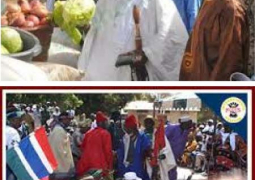The third National Global Handwashing Day was commemorated on Friday at Cannan Multi-Purpose Training Centre in Brikama, Western Region.
The commemoration began with a match-past of schoolchildren and voluntary organisations led by the police band from Castle Petrol Station opposite Brikama Mini Stadium to Cannan Multi-purpose Training Centre.
The theme for this year's commemorations is: "More than Just a Day". It seeks to make the simple, life-saving practice of washing hands with soap at critical times a regular habit.
UN General Assembly on 2008 set aside the International Year of Sanitation and Handwashing Day to be celebrated every year to promote local and global culture in handwashing.
Speaking on the occasion, Abdou Karim Sonko, deputy permanent secretary at the ministry of Health and Social Welfare, who deputised the Gambian leader, said Handwashing Day is an important aspect of life. "Handwashing is to maintain appropriate hygiene conditions in our homesteads, particularly for our younger generation and children thus half of 120 million children born in the developing World live in households without access to improved sanitation, posing grave risk to their survival and development."
According to him, poor hygiene and lack of access to sanitation contribute to about 88% of deaths from diarrhoea diseases, accounting for 1.5 million diarrhoea-related under-five deaths each year.
In The Gambia, he explained, portable drinking water is gradually becoming a thing of the past, saying that "even the most remote corners of the country have portable water, which has really surpassed the MDGs target for this goal".
"More children are alive to celebrate their 5th birthday today than in the 1980s and early 1990s with a reduction of child deaths from 153% to 109," he said.
He continued: "Between 2008 to date we have distributed more than 15,000 bars of soap to 220 schools as a result of a clarion call by a cross-section of society in the country made up of faith-based organisations, media and NGOs, together with the private sector and government officials, to embrace quick wins for children, which would guarantee greater chances of survival for children."
The Communication specialist at UNICEF, Sally Sadie Singhateh, expressed her organisation’s support to the efforts being made to ensure more children have a stronger chance to survive, thrive and lead healthy lives.
"We are encouraged to see that the commitment is not limited to government, civil society organisations and UN development partners but runs through all levels including the private sector," Ms Singhateh said.
In addition to joining hands with Global Public-Private Partnership for Handwashing with Soap to mark this important day, Ms Singhateh said, "UNICEF are very pleased to note that national partnership and handwashing, especially handwashing with soap in schools, keeps expanding and growing from strength to strength with each year as more local business get on board."
She continued: "Rates of handwashing at critical times around the World are low thus estimated at zero to 34% emphasising that handwashing with soap and water as one of the most effective and affordable means of promoting good health and saving children's lives."
Ms Sighateh said pneumonia, a respiratory disease, is the number one cause of deaths among children under the age of five. It takes an estimated 1.8 million children every year, she said, adding that higher rates of handwashing with soap would significantly contribute towards meeting MDG4 on reducing deaths of children under the age of five by two-thirds, by 2015 while a study conducted in 2008 demonstrated that handwasing with soap by birth attendants and mothers significantly increased newborn survival rates by up to 44%.
Other speakers on the occasion included BAC chairman Sunkary Bagjie. Chaired by Acting Director of Health Services, Dr Adama Demba, the event was punctuated with entertainment by Jaliba Kuyateh, a UNICEF goodwill ambassador.


